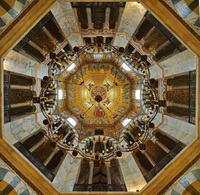Speaker
Description
In this talk I will review the current status of the radioisotopes trapping program at the Soreq Applied Research Accelerator Facility (SARAF), and prospects for measurements at the upgraded accelerator: SARAF-II.
In our new lab complex, situated above the SARAF target room, we utilize two systems: An electrostatic-ion-beam-trap,designed for trapping various radioactive ions, starting with $^6$He; and a magneto-optical trap, which is designated for various rare neon isotopes, starting with $^{23}$Ne.
Both traps are equipped with novel designs for the detection of recoiling particles from nuclear $\beta$-decay and precise measurements of the kinematic correlations between them. These correlations are sensitive to scalar- and tensor-current interactions which are suggested by some beyond standard model (BSM) theories [2]. Bounds on exotic interactions from the precision and high-energy frontiers are interpreted in the framework of a model-independent effective field theory approach [3].
[1] I. Mardor et. al., The Soreq Applied Research Accelerator Facility (SARAF) - Overview, Research Programs and Future Plans (2018).
[2] J A Behr and G Gwinner, Standard model tests with trapped radioactive atoms (2009).
[3] M. Gonzalez-Alonso, O. Naviliat-Cuncic, N. Severijns. New physics searches in nuclear and neutron $\beta$-decay (2018).
